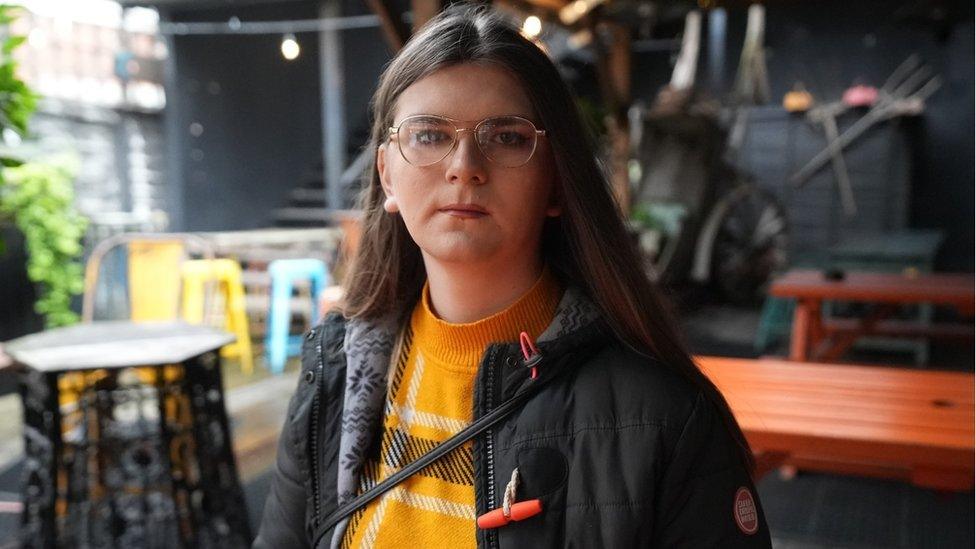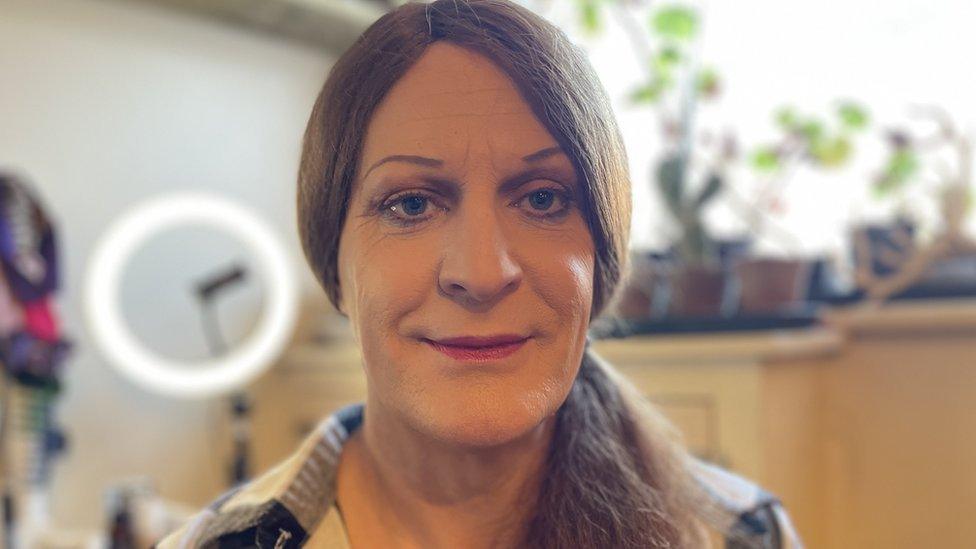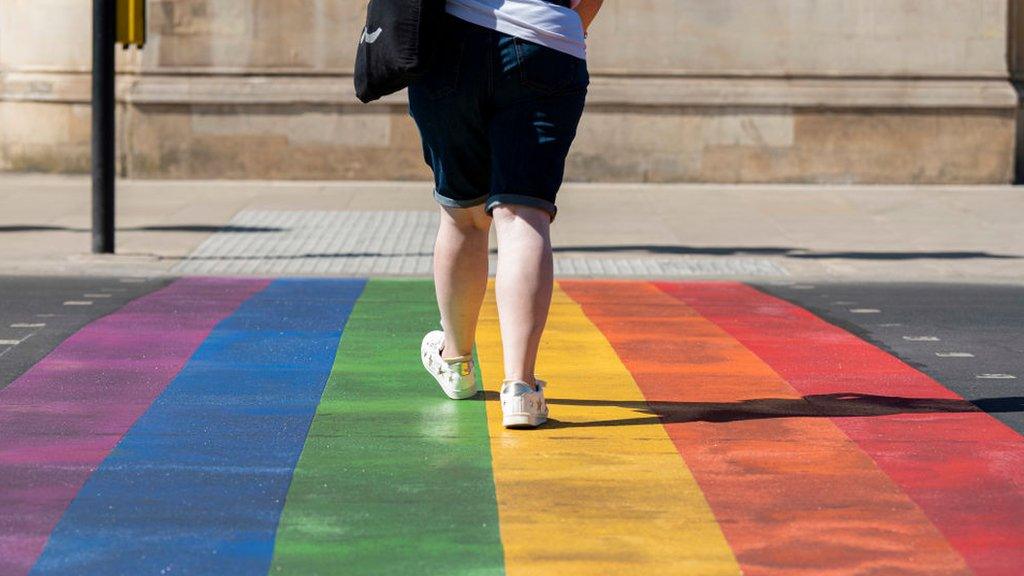Wait for gender support frustrating, trans woman says
- Published

Sonja told the BBC that she wanted to transition from the age of 15, but faced a four-year wait to see an NHS specialist
A landmark review has said that children have been let down by "remarkably weak" evidence on medical interventions in gender care.
People who have accessed support services and their families told the BBC about their experiences, with some echoing findings from the report.
A trans woman, Sonja, said she had waited four years before being seen by an NHS specialist, describing it as "an incredibly dark period in terms of my mental health."
She said the long delays waiting for access to support were "frustrating" and hard to cope with.
"It was the lowest I have been during the course of my transition, because of me having to wait as long as I did," she said, adding that she went through "pretty much the full course of male puberty" in that time.
"I felt incredibly uncomfortable, incredibly dissatisfied, it never felt like me, I always felt wrong. I didn't feel like I could accurately be myself. And that's purely because I had to wait so long to gain any semblance of care".
The Cass Review, external, published on Wednesday by paediatrician Dr Hilary Cass, looked at gender identity services for under-18s. The report called for these services to match the standards of other NHS care, treating the person as a whole rather than solely in relation to their gender distress.
Watch: Dr Hilary Cass discusses gender care for children
Children have been let down by a failure to base gender care on evidence-based research, the report said. It also recommended that in future, when young people are referred for help, they should be given screening for neurodevelopment conditions such as autism, and a mental health assessment.
The review was commissioned in 2020 after a sharp rise in the number of patients, particularly girls, referred to the NHS who were questioning their gender.
Sonja wanted to access services to begin her transition from the age of 15, but was put on a waiting list and was transferred to adult services at 18 - where she faced another wait before choosing to go private.
In her report, Dr Cass highlighted many people "have waited too long" for access to specialist services.
Puberty blockers
Wednesday's review urged "extreme caution" around prescribing puberty blockers - defined by Dr Cass as hormones that "stop the progress of puberty" - to children, saying there was little evidence of the medication's long-term impact into adulthood.
Sonja, who is now receiving continuing NHS care, said that in her case "puberty blockers would have been a huge lifeline that I never had access to".
Pink News journalist Amelia Hansford, who began transitioning 10 years ago, told BBC Radio 4's PM programme that the wait to access support services "can mean the development of depression, the development of anxiety" in people seeking help.
She said the debate surrounding gender had become "volatile" and trans people "don't feel safe online".
In 2020, a 23-year-old woman took legal action against the Tavistock and Portman NHS Trust - home of the now closed Gender Identity and Development Service (Gids) which provided her with puberty blockers. The Court of Appeal eventually ruled in favour of the Tavistock Trust.
Keira Bell had previously argued that she had not been challenged enough and regretted her decision. Her solicitor welcomed the findings of the Cass Review.
"It is very reassuring for young people who are gender-questioning, and their parents. Hopefully there'll be a new service developed that will meet their needs appropriately," Paul Conrathe told the BBC.
"It is, unfortunately for many young people, too late. Concerns that had been raised in yesteryear that weren't heeded and ultimately had to be played out in [the courts] have been justified.
"They live with the ongoing consequences of poor clinical treatment and their lives have been forever changed."
Gids closed last week, four years after it was rated as "inadequate" by inspectors.
Son 'different person' after transition
For Keith, the father of a 27-year-old non-binary son who transitioned, and is now an "amazing, really happy young adult", the NHS was "very rigorous" in their assessment.
His son said he wanted to transition at the age of 16, after being unhappy as a child "with the body that he was in", and the process that followed was a positive one - with the whole family getting support throughout.
"If a child is unhappy in the body they are in, and they have the guts to come and speak to you about it, as a parent all you can do is try to be supportive of it - as much as possible - to try and make them a happier person," he told Radio 5 Live's Nicky Campbell.
His son Leo, who uses he/him pronouns, is a "different person" because of the treatment he received to allow him to transition, Keith said.
Diagnosis 'too fast'
In her report, Dr Cass raised concerns about what she called "diagnostic overshadowing" - when patients' other healthcare issues were overlooked in cases of patients questioning their gender.
Young people seeking treatment could not improve if a "broader range of problems were not being addressed", she told Radio 4's Today programme.
Phil from Essex felt his 13-year-old daughter was diagnosed with gender dysphoria - a mismatch between a person's biological sex and their gender identity - too quickly after other medical professionals suggested she was displaying signs of autism.
A doctor diagnosed his daughter but ignored the family's concerns about autism, he said, highlighting the "outrageous" speed at which she was diagnosed.
In comparison, Phil recalled that his daughter's autism diagnosis - which happened years later in August 2023 - took "hours" and that there were "multiple doctors" involved.
"How can anyone be diagnosed in five minutes? That's really all it was," he said. "We felt let down by the system - we've had to battle and battle and battle ever since."
"We've gone from a happy, tight family unit - and I know teenagers don't always get on with their parents - but we've gone from that to missing out on it for three to four years."
One issue, Phil suggested, is the "lack of child psychologists available" and in his daughter's case, this played a big part in her education and happiness.
"If we'd had that, she may have had a much more productive secondary education".
- Published10 April 2024

- Published20 March 2024

- Published16 May 2024
